What Happens to Your Body When You Eat Bacon
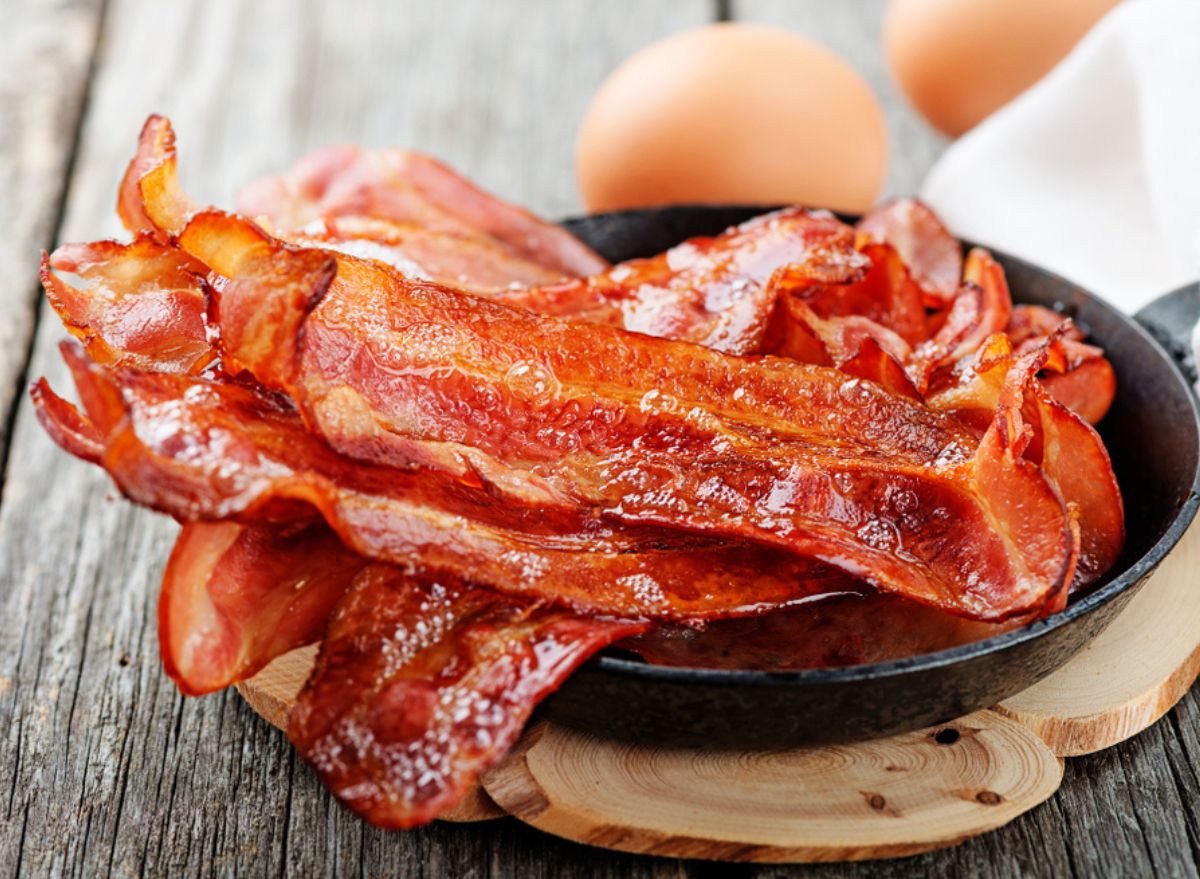
There aren’t many people who don’t love bacon. Nothing beats waking up to the smell of it cooking on the stove, or finding it crumbled over a wedge salad, or even enjoying it as a fun topping on a maple bacon donut. This processed meat is affordable and full of flavor, which is why it’s so beloved and incorporated into meals at breakfast, lunch, and dinner. However, research in recent years has shown that processed meat is generally accompanied by some harmful side effects. So, does that mean bacon is bad for you? Or is it OK to have it in moderation? And, although you’ve likely heard about some of the negative effects of eating bacon, are there any benefits as well?
When it comes to processed meats like bacon, the possible harm comes from higher levels of sodium, saturated fat, and preservatives. When eaten in moderation, experts say that it should be OK; regular consumption of this processed breakfast meat, on the other hand, can be especially harmful to a healthy diet.
In an average slice of cured pork bacon, you’ll find higher amounts of fat and sodium, but you’ll also have a decent amount of protein and major vitamins. These levels depend on the type and brand you buy, but according to the USDA, a slice of bacon contains:
- 110 calories
- 3.8 grams of protein
- 10.4 grams of fat
- 3.5 grams of saturated fat
- 0 grams of carbohydrates
- 0 grams of fiber
- 210 milligrams of sodium
To learn more about what happens to your body when you eat bacon and whether or not bacon is actually bad for you, we talked with a registered dietitian and looked at what the current research says. Read on to find out what happens to your body when you eat bacon, and next, learn about What Happens to Your Body When You Drink Alcohol Every Day.
What happens to your body when you eat bacon
You can get more protein.
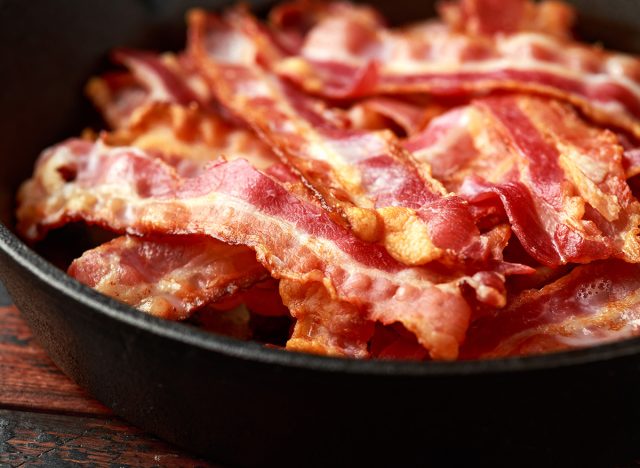
One of the benefits of eating bacon is that this cured meat can give you a quick and easy boost of protein in any meal of the day. “Just one slice of medium thick bacon has approximately three to four grams of protein,” says Trista Best, MPH, RD, LD at Balance One Supplements. “For those eating a relatively low-protein meal or diet, adding a slice of bacon can increase your protein intake and the satiety of that meal.” She adds that, “For instance, a salad’s protein content can be increased by simply adding a piece or two of bacon, adding a slice to a sandwich, or rather than a breakfast of just pancakes, you can add bacon to stay full longer.”
You may consume potentially harmful preservatives.

Bacon is considered a processed meat, which means it often contains additives and preservatives. Unfortunately, many of these ingredients have been found to have negative health effects.
For instance, sodium phosphate is one of the most common additives you’ll find in bacon, and that has been linked to faster aging and possible vascular damage. Another common ingredient added to bacon and processed meats is sodium nitrate, which has been associated with breast, colorectal, and prostate cancer.
Bacon lovers will be happy to know that there are some brands out there making bacon without these preservatives. Look for the term “uncured” on the package, and check the ingredients list before buying in order to find additive-free bacon.
You may increase your risk of heart disease.

Processed red meats—including bacon—have been found to have potentially negative effects on heart health when consumed on a regular basis.
According to a study published in Circulation, the regular consumption of these meats is specifically associated with a 42% increased risk of coronary heart disease and a 19% increased risk of diabetes.
An even newer report, published in the American Journal of Clinical Nutrition, found that eating more than 150 grams of processed meat per week (approximately five slices of bacon) was associated with an increased risk of cardiovascular disease by almost 46% compared to not eating processed meat at all.
Eating it regularly could be a problem for people with high blood pressure.
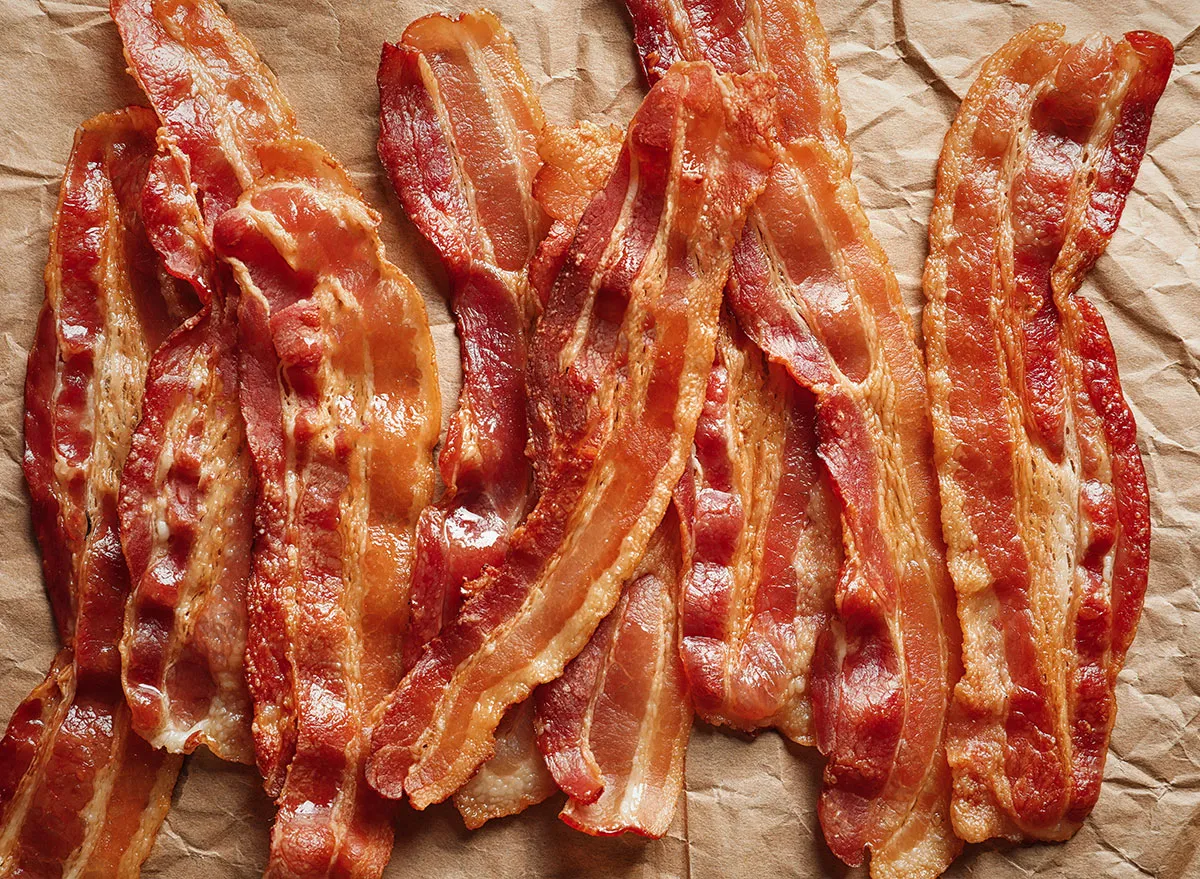
“For those with an existing hypertension diagnosis, or those who are borderline, eating bacon regularly can be a dangerous habit,” says Best. This is due to the fact that “Bacon is high in sodium, which can contribute to increased blood pressure by promoting water retention and constricting blood vessels.”
Aside from the higher levels of sodium, bacon also often contains higher levels of saturated fat, and sometimes trans fat. “The saturated and trans fats in bacon can also lead to arterial plaque buildup, further narrowing blood vessels and potentially worsening hypertension,” adds Best.
Your risk for cancer may increase.

Bacon is a type of processed meat, so your risk for cancer may increase. That’s because processed foods like bacon, sausage, and deli meats are classified as Group 1 carcinogens, meaning these products have been proven to sometimes lead to an increased risk of cancer. According to a report published in Nutrients, regularly eating processed meats was linked to a possible increased risk of stomach, esophageal, colorectal, and pancreatic cancer. These findings, however, are not isolated, as it also depends on other lifestyle factors.
So the big takeaways here? Bacon isn’t all that bad for you, as it can help provide an easy and affordable way of getting protein and some extra vitamins. But, consuming this processed meat in moderation is best, and if you have existing issues with your heart health or blood pressure, it’s best to proceed with caution and talk with your doctor.
You’ll get some good fats and some not-so-good fats.
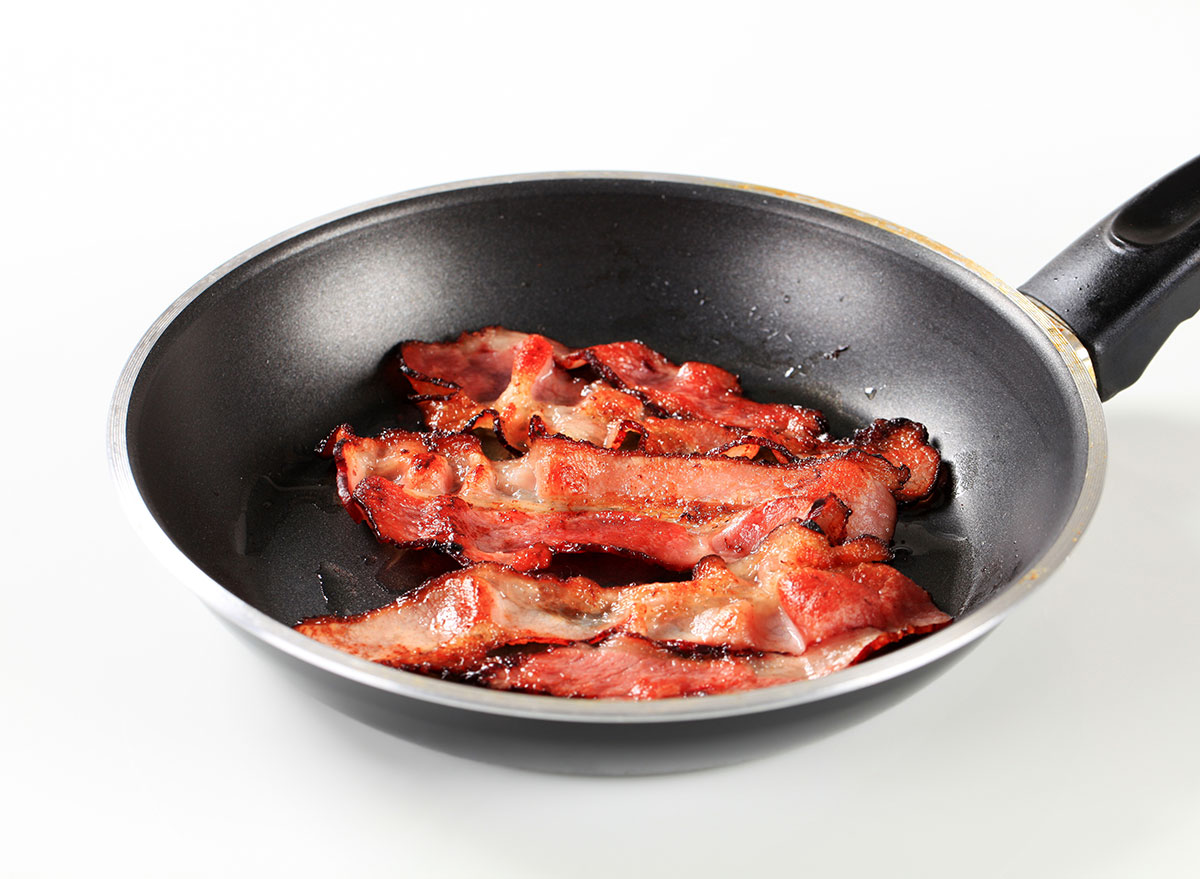
It’s no secret that bacon is full of fat. The juicy, fattiness of a nice strip of bacon is what makes it so good! But what type of fat is bacon made of?
Well, bacon is primarily made of 50% monounsaturated fats, 40% saturated fats, and 10% polyunsaturated fats, and according to The Nutrition Journal, all three of these fats can be a part of a well-balanced diet.
As The Nutrition Journal explains, monounsaturated fats can actually help balance cholesterol levels and reduce the risk of heart disease. Saturated fats sometimes tend to have a negative reputation, but they aren’t all that bad. You’ll find these fats mostly in animal products, and they should definitely be consumed in moderate quantities. Polyunsaturated fats, which are found in many fish products, are also good for your heart and cholesterol levels.
Although saturated fats in small quantities aren’t so bad for you, bacon still contains about 40% in every serving. It’s important to focus on exactly where you’re getting your saturated fats; you may want to limit your bacon intake and be sure you’re getting saturated fats from coconut oil or coconut butter to help balance out your diet.
You’ll consume some vitamins.
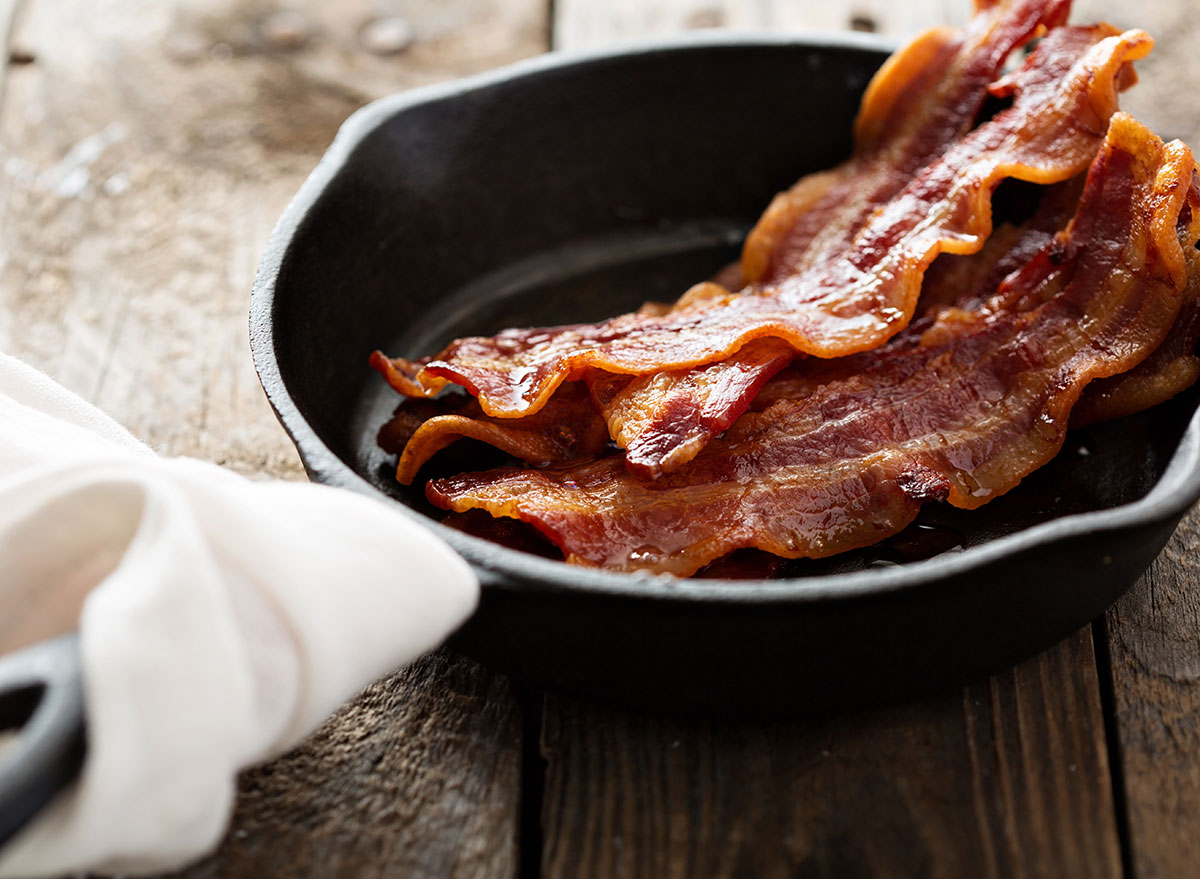
Most people don’t realize this, but bacon actually contains a ton of vitamins as well. So when you eat bacon, you’ll be treated to plenty of vitamins, including B6 and B12 along with iron, zinc, magnesium, and selenium.
The Nutrition Journal agrees that these are helpful vitamins to ingest at breakfast, but adds that there are plenty of other fresh, leafy greens and lean meat that you can get these vitamins from instead.
The grease may cause a gut imbalance.

Animal products and fatty foods have been known to help balance out your gut microbiome and help soothe the lining of your stomach. This is one of the many reasons people obsess over bone broth! But according to the World Journal of Gastroenterology, large amounts of saturated fats or greasy foods can actually knock off the natural balance of your gut microbiota.
When we eat healthier fats like fats from fish or avocados, we are helping the balance of our body’s fatty acids. But when we consume large amounts of greasy foods, which are higher in not-so-healthy fats, it can actually knock things out of whack. This happens because processed fats and oils can create more gut bacteria, which harms the necessary bacterias that our gut naturally thrives on.
A previous version of this story was published on June 5, 2020. It has been updated to include additional copy and proofreading revisions, additional research, and updated contextual links.
- Source: https://fdc.nal.usda.gov/fdc-app.html#/food-details/168277/nutrients
- Source: https://www.ncbi.nlm.nih.gov/pmc/articles/PMC3278747/
- Source: https://www.nature.com/articles/s41538-022-00174-y
- Source: https://www.ncbi.nlm.nih.gov/pmc/articles/PMC2885952/
- Source: https://www.sciencedirect.com/science/article/pii/S0002916522004282?via%3Dihub
- Source: https://www.who.int/news-room/q-a-detail/q-a-on-the-carcinogenicity-of-the-consumption-of-red-meat-and-processed-meat
- Source: https://www.ncbi.nlm.nih.gov/pmc/articles/PMC5577766/
- Source: https://fdc.nal.usda.gov/fdc-app.html#/food-details/168277/nutrients
- Source: https://www.ncbi.nlm.nih.gov/pmc/articles/PMC5385025/
- Source: https://www.ncbi.nlm.nih.gov/pmc/articles/PMC5083795/









